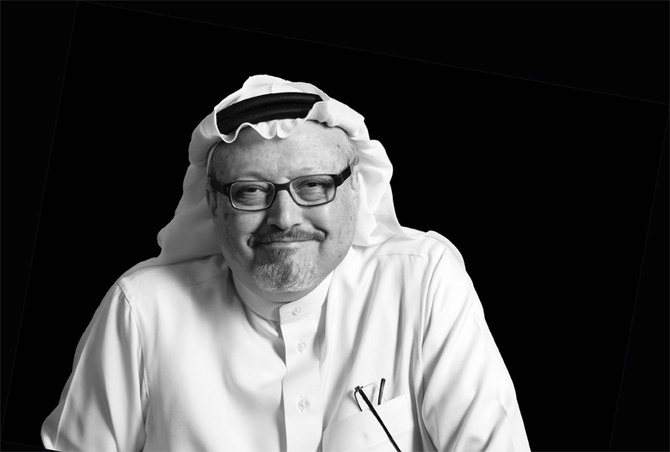JEDDAH: A “heinous crime” is how Saudi Crown Prince Mohammed bin Salman this week described the murder of journalist Jamal Khashoggi a year ago at the Saudi Consulate in Istanbul.
Many questions have been asked of what happened that day, and most went unanswered until a TV interview on Sunday, when the crown prince took it upon himself to address as many of them as possible.
He chose to be interviewed by one of the most prominent US journalists, Norah O’Donnell, on one of the most respected network news shows, CBS “60 Minutes.”
O’Donnell asked the toughest question first: Did the crown prince order the killing? He categorically denied having done so, but nevertheless accepted responsibility: “When a crime is committed against a Saudi citizen by officials working for the Saudi government, as a leader I must take responsibility.”
When O’Donnell pressed the crown prince on how he could not have known of the operation, he replied: “Some think that I should know what three million people working for the Saudi government do daily. It’s impossible that the three million would send their daily reports to the leader, or the second-highest person in the Saudi government.”
So what happened on that fateful day? Khashoggi entered the Saudi consulate in Istanbul on Oct. 2, and never left alive. Saudi Arabia’s deputy public prosecutor, Shalaan Al-Shalaan, told a press conference in Riyadh on Nov. 15 that Khashoggi had been killed inside the consulate by a lethal injection after a struggle, and that his body was dismembered and handed over to a local Turkish agent outside the consulate grounds. The leader of Khashoggi’s negotiation team had ordered the killing, he said.
In January this year, 11 people went on trial in connection with Khashoggi’s death, and prosecutors sought the death penalty for five of them accused of his murder.
As Saudi investigators revealed the often gory and gruesome details of the case, there was shock and horror in the Kingdom. The Saudi businesswoman Lubna Olayan said Khashoggi’s death was a “terrible act, alien to the Saudi culture and DNA,” a sentiment that resonated with almost everybody — Saudi and non-Saudi — in the country.
As the facts emerged, however, so did fictionalized and distorted accounts from parties hostile to the interests of Saudi Arabia. Political games were being played, particularly in the US and in Turkey.
In Washington, those with an ax to grind against Donald Trump used the tragedy to take potshots at the US president. They saw Khashoggi’s murder as a tool to undermine the president because of his close relationship with the Saudi leadership. Trump saw through that gameplan, and stood steady as a rock in defending Saudi Arabia and its leadership as a key American ally in the region.
“It’s an honor to be with the crown prince of Saudi Arabia, a friend of mine, a man who has really done things in the last five years in terms of opening up Saudi Arabia,” Trump said in Japan in June. “And I think especially what you’ve done for women. I’m seeing what’s happening; it’s like a revolution in a very positive way.”
Those words were a bolt from the blue for the critics of Saudi Arabia, but no surprise to perceptive analysts. Michael Doran, a Middle East expert at the Hudson Institute in Washington, told a conference: “Since the murder of Jamal Khashoggi, everybody in America knows his name. We have got in China a million people in concentration camps. There hasn’t been as much attention on that as on Jamal Khashoggi. Why? Why? Why?”
Having asked the question, he supplied the answer: “It is not because of Saudi Arabia, it is not because of MBS, it is because of the relationship between Jared Kushner and MBS. It is an indirect way of going after Trump. The Iranians and Hezbollah and other Iranian proxies have uprooted 10 million people in Syria. They have killed 500,000 people in Syria. Everyone of them has a name.”
Meanwhile Turkey played a different game, but with a similar goal; to tarnish the image of Saudi Arabia in the Muslim world and beyond. President Recep Tayyip Erdogan aligned himself with Qatar, and both played roles in muddying the water.
Thus, what was in essence a crime and a tragedy quickly became a political witchhunt, with Saudi Arabia the prey. Khashoggi’s murder has become a political tool in the hands of the Kingdom’s detractors in the West and in the region, said Dr. Hamdan Al-Shehri, a Saudi political analyst and international relations scholar. “This episode should have been closed after all Saudi Arabia’s actions,” he said. “The trial is on, the suspects are in custody, the prosecutors have sought the highest penalty. To continue harping on about Khashoggi’s murder is a clear case of political vendetta.”
He drew attention to a statement on Monday by Khashoggi’s son Salah, expressing faith in the Saudi judicial system and denouncing those who politicize his father’s case.
“My father never tolerated any abuse or attempt to harm (the Kingdom), and I will not accept his memory or his cause being taken advantage of to achieve that,” Salah said.
Despite his plea, political opportunists continue to exploit the Khashoggi case, while justice waits to be served.
































